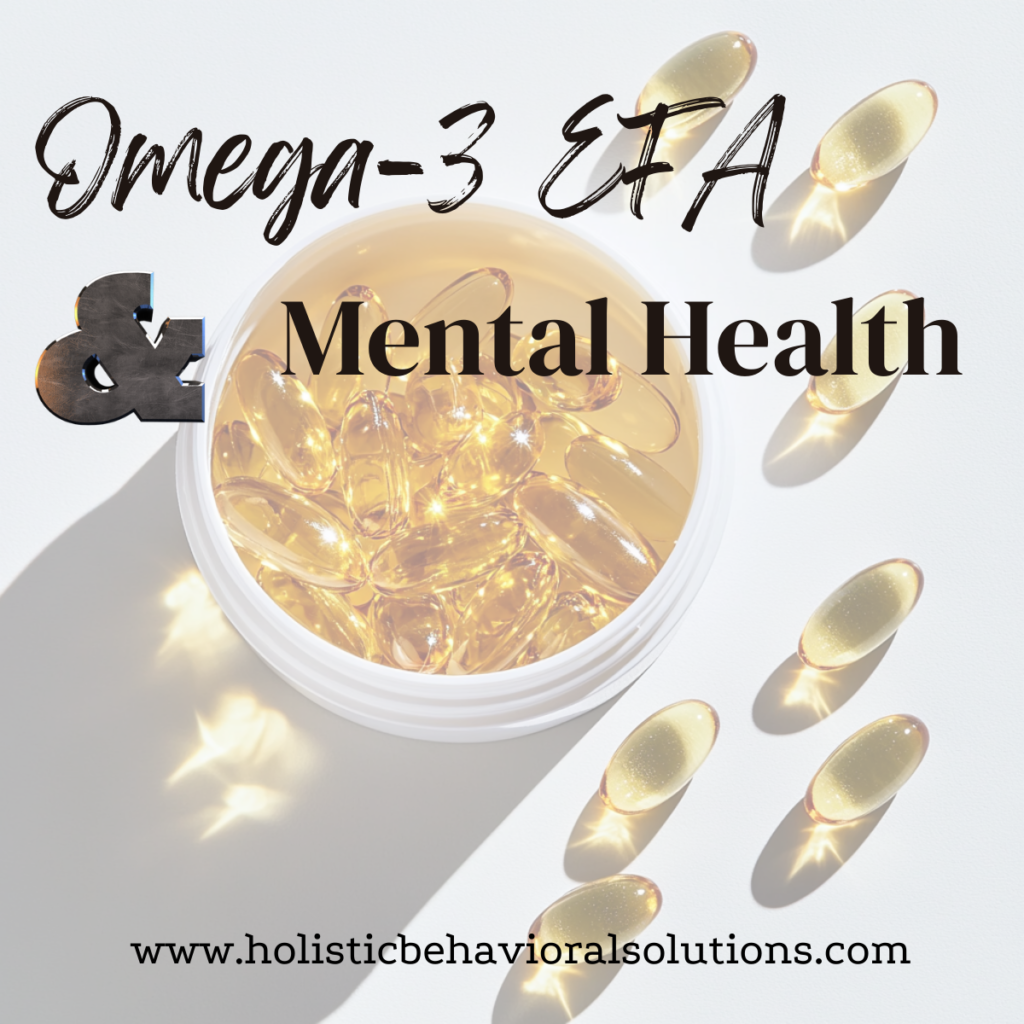
Omega-3 fatty acids: Mental health forms the cornerstone of overall wellness, influencing how we think, feel, and navigate daily life. While many factors affect mental health—like genetics, lifestyle, and environment—nutrition has emerged as a powerful player in maintaining cognitive balance and emotional stability.
Among the most studied nutrients in this holistic health and wellness are omega-3 fatty acids, particularly the long-chain varieties: EPA (eicosapentaenoic acid) and DHA (docosahexaenoic acid). These essential fats are critical for brain function and are increasingly being linked to the prevention and management of psychiatric disorders.
How Omega-3 Fatty Acids Support Brain Health
Omega-3 fatty acids are essential for brain development, communication between neurons, and reducing neuroinflammation. EPA and DHA, in particular, support the following:
- Neurogenesis: Growth and repair of brain cells
- Neurotransmission: Smooth signaling between nerve cells
- Cognitive performance and emotional regulation
A growing body of research suggests that omega-3 deficiencies are associated with a higher risk of conditions such as depression, anxiety, bipolar disorder, ADHD, schizophrenia, and dementia. These fatty acids contribute to healthy cell membrane structure and modulate inflammation—two key factors in brain health and mood stability.
The Impact of Omega-3 Deficiency on Mental Well-Being
Modern diets, especially the Western diet, tend to be heavy in omega-6 fatty acids and low in omega-3s. This imbalance can lead to chronic inflammation, which has been tied to both cognitive decline and the onset of mental health disorders.
Critical Stages of Omega-3 Needs:
- During pregnancy and early childhood, omega-3s are crucial for brain and nervous system development.
- In adults, they help maintain cognitive function and may reduce the risk or severity of neurodegenerative diseases like Alzheimer’s and Parkinson’s.
Without adequate omega-3 intake, the brain may struggle to regulate mood, memory, and stress responses.
Omega-3 Supplementation and Mental Health: What the Research Says
Multiple clinical trials and observational studies have investigated the effects of omega-3 supplementation on mental health. Some studies show promising results, including:
- Reduced symptoms in major depressive disorder
- Mood stabilization in bipolar disorder
- Potential improvements in schizophrenia, ADHD, and anxiety disorders
However, research outcomes vary. More long-term, high-quality randomized controlled trials are needed to determine the full therapeutic potential of omega-3s in psychiatric care.
Despite the mixed results, the overall trend supports the idea that omega-3s play a positive role in brain function and mental well-being.
Achieving a Healthy Omega-3 to Omega-6 Ratio
Omega-6 fatty acids (common in processed foods and vegetable oils) are pro-inflammatory, while omega-3s are anti-inflammatory. An imbalanced ratio can exacerbate inflammatory conditions, including those affecting the brain.
Aim for a balanced diet that supports a healthier omega-3 to omega-6 ratio by reducing processed foods and increasing omega-3-rich foods or supplements.
Best Food Sources of Omega-3 Fatty Acids
Incorporating omega-3s into your diet is both simple and beneficial. Here are top sources of EPA and DHA:
- Fatty fish like salmon, sardines, mackerel, and anchovies
- Flaxseeds, chia seeds, and hemp seeds
- Walnuts
- Omega-3-enriched eggs
- Algae oil (a plant-based source suitable for vegans)
While plant-based sources offer ALA (alpha-linolenic acid), it’s EPA and DHA that have the strongest links to brain health—so fish oil or algae-based supplements can be a valuable addition for many.
Final Thoughts: Omega-3s as a Foundation for Mental Health
The evidence linking omega-3 fatty acids and mental health continues to grow, reinforcing the idea that what we eat significantly impacts how we think and feel.
While omega-3s are not a standalone cure for mental illness, maintaining adequate levels—through diet or supplementation—can support emotional balance, cognitive clarity, and long-term brain health.
As part of a holistic lifestyle that includes physical activity, stress management, sleep, and professional care, omega-3s may offer an important boost to your overall mental well-being.
TL;DR: Why Omega-3s Matter for Your Brain
- Omega-3 fatty acids (EPA and DHA) are essential for brain development, mood regulation, and reducing inflammation.
- Deficiencies are linked to conditions like depression, bipolar disorder, ADHD, and dementia.
- Incorporating more omega-3-rich foods or supplements may support mental health and protect against cognitive decline.
Shop Omega-3 Fatty Acids and Mental Health Supplements
Support your mental health naturally—make omega-3s part of your daily routine. Visit The Holistic Store for premium-grade omega-3 supplements designed to boost brain power and emotional balance.
Take the proactive step towards better mental health—fuel your brain with what it needs to thrive.

